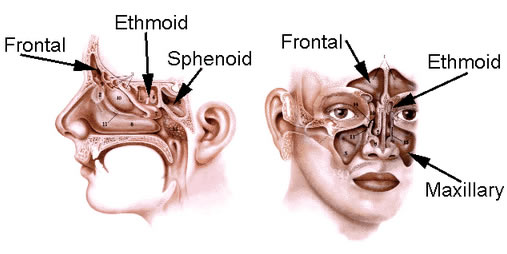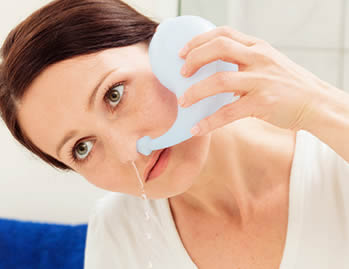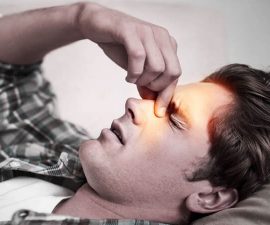Sinus infection is usually mild, not serious. It rarely causes complications, though in a few cases it may lead to serious conditions such as meningitis. However, it can also be very bothersome. The good news, there are some lifestyle measures and home remedies to help get rid of it fast.
Is sinus infection difficult to treat?
Sinuses are air-filled spaces (cavities) located around your nose and face. There are several sinus cavities (see the image below, credit to the Ohiosinus Institute), each is named according to the bone where they are located.
These air-filled spaces have many functions, such as:
- To help filter and humidify air that you breathe.
- In trauma situations, they can help protect some vital structures.
- Or to help lighten the weight of your head (in evolutionary terms).
A number of different conditions can affect sinuses. Sinus infection a.k.a ‘sinusitis’ is one of the main ones.
There are complex lining and millions of cilia (very tiny hair-like structure) that cover the sinuses. Mucus is secreted by the lining to help protect and keep the sinuses moist.
Normally, the mucus drains out into the nose. But in sinusitis, this normal mechanism is affected. The infection causes inflammation that inhibits or blocks the drainage. This can worsen the infection, causing a vicious cycle.
How long does it take to relieve? The answer can vary. It can be acute, sub-acute, or even chronic. Acute means that the infection usually lasts not more than 4 weeks. Chronic means it lasts 8 weeks or longer.
Fortunately, it is usually easy to treat. Many times, it responds with lifestyle measures. Even in some cases, it improves on its own.
How to get rid of a sinus infection fast at home?
The treatment is not always necessary. Because it usually works itself out within a few days or weeks with nothing more than rest and liquids.
But if you do find it hard to cope, there are also plenty of options to help boost your recovery and get rid of it fast. In general, home remedies for sinusitis are outlined below.
Make your room as comfortable as possible!
When your heater is on, your sinuses can get dry easily. As a result your mucus doesn’t drain out as well as usual, making your sinusitis symptoms worse.
There is no specific indoor temperature you need to follow since it can vary from person to person. Just make sure that it is comfortable enough for you. For example, you should feel comfortable even when you wear only a T-shirt.
Coping with sinusitis can be harder if you also have allergy. Avoid any allergens that can trigger your allergy! Clean all surfaces regularly, use covers on your mattresses and pillows, keep your dog /cat out of your bedroom, and reduce any clutter that can trap dust!
Furthermore, extreme humidity (either too dry or too humid) is also bad for your sinusitis symptoms. Therefore, it’s not bad idea to also use a humidifier – particularly from October to March /April (during dry months), and don’t use it in humid days!
The unit can help provide ideal humidity level in your room and this can help boost your recovery more quickly. For most people, 35-50 percent humidity is the best choice. The humidity level higher than 50 percent is bad if you have allergy to dust mites, because they love it. Molds, which may set off sinus problem in some cases, also love too much humidity indoors.
Keep the unit clean and do the maintenance regularly (especially for the air filter of the unit)! A dirty humidifier can be counterproductive, because it may breed mold and worsen your sinus problem.
Ventilate your room!
When it comes to saving more energy, energy-efficient room is one of the answers. But it also has drawback. For instance, it can lead to stale air in your room, making your sinus problems more likely.
The key is you need to know when to open up your room and when to seal it. For example, open your windows on a warmer day. But if the pollen count is high, don’t do that!
The idea for cleaning air ducts of your HVAC (heating, ventilation and air conditioning) system is debatable among experts. While it is important to maintain the quality of air in the room and keep the system work efficiently, it is also a waste of time & money.
Even some people find that they got sicker because of aggravating airborne dust after cleaning the ducts. But if the air smells moldy or dusty, cleaning air ducts is worth a try. Clean also the air filters of your HVAC unit on a regular basis!
Stay hydrated!
Getting plenty of liquids everyday helps your body in many ways, including helping to improve your sinus problem by keeping your nasal cavities moist. The recommended liquid intake can vary. But in general, drinking about eight 8-ounce glasses throughout the day is easy guideline for most people. Make sure to drink enough so your pee is generally clear!
But not all beverages are helpful to hydrate the body – even some can be counterproductive. For example, beverages containing alcohol and caffeine can lead to dehydration.
Take a steam!
Another thing to help moisten your sinuses is with hot water vapor. Take a warm, steamy bath by sprinkling a few drops of menthol or eucalyptus! This idea can also help loosen up excess debris or mucus inside your nose.
Saline nasal solution
You can buy it in your local pharmacy store (choose one without decongestant)! Or you can make it on your own at home.
For example, you can make salt-water nasal solution by mixing about 1 teaspoon of salt (iodine-free salt is more recommended) into 16 ounces of sterile (distilled), previously boiled water. If you want to reduce the sting of the salt, add about a half teaspoon of baking soda! Then use a bulb syringe!
Another way to flush your nasal cavities is with ‘neti pot’, a tea-like pot with a long spout.
Pour you saline nasal solution into the neti pot. Tilt your head about 45 degrees and put the spout into the top of your nostril, and then pour the solution in gently! Refill your neti pot and repeat the procedure for the other side!
But is the use of neti pot with saline nasal solution safe for anyone?






